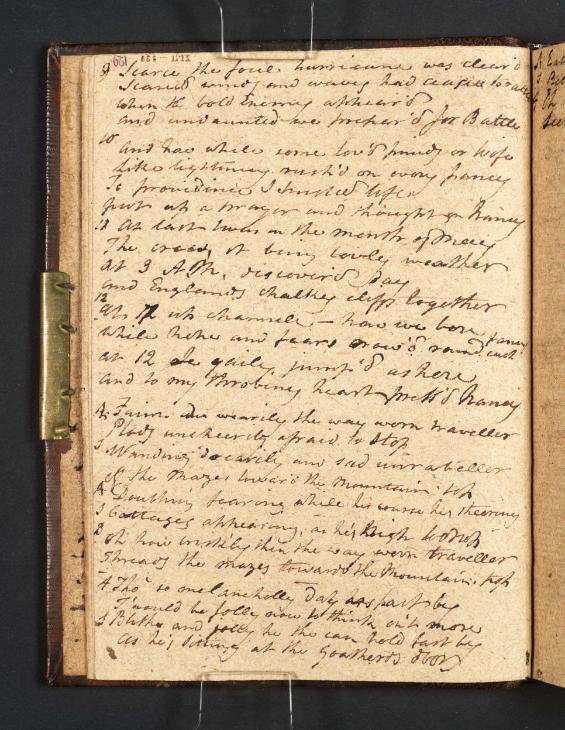Joseph Mallord William Turner Inscription by Turner: Song Lyrics 1798-9
Joseph Mallord William Turner,
Inscription by Turner: Song Lyrics
1798-9
Joseph Mallord William Turner 1775–1851
Folio 65 Recto:
Inscription by Turner: Song Lyrics 1798–9
D01804
Turner Bequest XLII 129
Turner Bequest XLII 129
Pen and ink on buff laid paper, 174 x 125 mm
Inscribed by Turner in ink with lines of verse (see main catalogue entry)
Inscribed by John Ruskin in red ink ‘129’ top left, upside down
Stamped in black ‘XLII – 129’ top left, upside down
Inscribed by Turner in ink with lines of verse (see main catalogue entry)
Inscribed by John Ruskin in red ink ‘129’ top left, upside down
Stamped in black ‘XLII – 129’ top left, upside down
Accepted by the nation as part of the Turner Bequest 1856
References
1909
A.J. Finberg, A Complete Inventory of the Drawings of the Turner Bequest, London 1909, vol.I, p102, XLII 129, with transcription, p.105, as ‘verses.’ c.1798.
1961
Alexander J. Finberg, The Life of J.M.W. Turner, R.A. Second Edition, Revised, with a Supplement, by Hilda F. Finberg, revised ed., Oxford 1961, p.81.
1990
Andrew Wilton and Rosalind Mallord Turner, Painting and Poetry: Turner’s ‘Verse Book’ and his Work of 1804–1812, exhibition catalogue, Tate Gallery, London 1990, pp.16, 17, transcribing second song.
Inverted relative to the sketchbook’s foliation, lines of verse inscribed in pen and ink fill the page:
9 Scarce the foul hurricane was clear’d
Scarced [sic] winds and waves had ceased to rattle
When the bold enemy appear’d
And undaunted we prepar’d for Battle
Scarced [sic] winds and waves had ceased to rattle
When the bold enemy appear’d
And undaunted we prepar’d for Battle
10 And now while some lov’d friends or Wife
Like lightning rush’d on every fancy
To providence I trusted life
put up a prayer and thought on Nancy
Like lightning rush’d on every fancy
To providence I trusted life
put up a prayer and thought on Nancy
11 At last ’twas in the month of May
The crew, it being lovly [sic] weather
At 3 A.M. discover’d day
And Englands chalky cliffs together
The crew, it being lovly [sic] weather
At 3 A.M. discover’d day
And Englands chalky cliffs together
12 At 7 up channell – now we bore
While hopes and fears crow’d [sic] round each [‘fancy’ inserted above]
At 12 I gaily jump’d ashore
And to my throbing heart press’d Nancy
While hopes and fears crow’d [sic] round each [‘fancy’ inserted above]
At 12 I gaily jump’d ashore
And to my throbing heart press’d Nancy
A Faint [?and] wearily the way worn traveller
Plods uncheerily afraid to Stop
S Wanding [sic] drearily and sad unraveller
Of the Mazes towar’d [sic] the Mountain top
A Doubting fearing while his course his steering
S Cottages appearing, as he’s nigh to drop
B Oh how briskly then the way worn traveller
Threads the mazes towards the Mountain’s top
A Tho’ so melancholly day has past by
T’would be folly now to think on’t more
S Blithe and jolly he the can hold fast by
As he’s sitting at the Goatherds door
Plods uncheerily afraid to Stop
S Wanding [sic] drearily and sad unraveller
Of the Mazes towar’d [sic] the Mountain top
A Doubting fearing while his course his steering
S Cottages appearing, as he’s nigh to drop
B Oh how briskly then the way worn traveller
Threads the mazes towards the Mountain’s top
A Tho’ so melancholly day has past by
T’would be folly now to think on’t more
S Blithe and jolly he the can hold fast by
As he’s sitting at the Goatherds door
The first four verses are the conclusion of Charles Dibdin’s popular ballad The Sailor’s Journal, which Turner began copying out on the verso of this leaf (D01805; Turner Bequest XLII 130). The second song is a duet from The Mountaineers, a 1793 musical play by Samuel Arnold (1740–1802). It too was well known in Turner’s day; it was intended to be sung by two alternating voices, Annie and Sophy. It is continued on folio 64 verso opposite (D01803; Turner Bequest XLII 128). It has been suggested that there is a link with the lost watercolour that Turner exhibited at the Royal Academy in 1802 with the title Ben Lomond Mountains, Scotland: The Traveller – Vide Ossian’s War of Caros,1 but there is no other evidence for this connection.
Arnold is remembered today as the composer of The Maid of the Mill and other musical dramas. Both Dibdin and Arnold were organists who were probably well known to John Danby, organist at the Roman Catholic Church in Spanish Place, with whose family Turner was intimate in the late 1790s; his widow Sarah was subsequently the mother of Turner’s two daughters.2
For other pages of lyrics towards the end of this sketchbook, see the entry for the inside of the back cover (D41426).
Andrew Wilton
March 2013
How to cite
Andrew Wilton, ‘Inscription by Turner: Song Lyrics 1798–9 by Joseph Mallord William Turner’, catalogue entry, March 2013, in David Blayney Brown (ed.), J.M.W. Turner: Sketchbooks, Drawings and Watercolours, Tate Research Publication, April 2015, https://www

